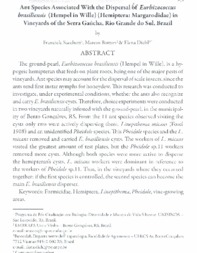Ant species associated with the dispersal of Eurhizococcus brasiliensis (Hempel in Wille) (Hemiptera: Margarodidae) in vineyards of the Serra Gaúcha, Rio Grande do Sul, Brazil.
Ant species associated with the dispersal of Eurhizococcus brasiliensis (Hempel in Wille) (Hemiptera: Margarodidae) in vineyards of the Serra Gaúcha, Rio Grande do Sul, Brazil.
Author(s): SACCHETT, F.; BOTTON, M.; DIEHL, E.
Summary: The ground-pearl, Eurhizococcus brasthensis (Hempel in Wille), is a hypogeic hemipteran that feeds oil plant roots, being one of the major pests of vineyards. Ant species may account for the dispersal of scale insects, since the ants tend first instar nymphs for honeydew. This research was conducted to investigate, Under experimental conditions, whether the ants also recognize and carry E. brasiliensis cysts. Therefore, choice experiments were condueted in two vineyards naturally infested with the ground-pearl, in the municipality of Bento Goncalves, RS. From the 11 ant species observed visiting the cysts Only two were actively dispersing them, Linepithema micans (Forel 1908) and all unidentified Pheidole species. This Phedole species and the L. micans removed and carried L brasiliensis cysts. The workers of L. micans visited the greatest amount of test plates, but the Phedole sp. 11 workers removed more cysts. Although both species were more active to disperse the hemipteran's cysts, L. micans workers were dominant in reference to the workers of Phedole sp. 11. Thus, in the vineyards where they occurred together; if the first species is controlled, the second species call become the main E. brasiliensis disperser.
Publication year: 2009
Types of publication: Journal article
Unit: Embrapa Grape & Wine
Observation
Some of Embrapa's publications are published as ePub files. To read them, use or download one of the following free software options to your computer or mobile device. Android: Google Play Books; IOS: iBooks; Windows and Linux: Calibre.
Access other publications
Access the Agricultural Research Database (BDPA) to consult Embrapa's full library collection and records.
Visit Embrapa Bookstore to purchase books and other publications sold by Embrapa.

